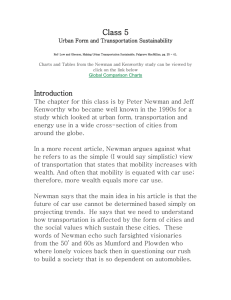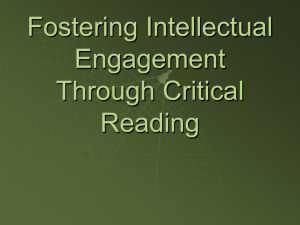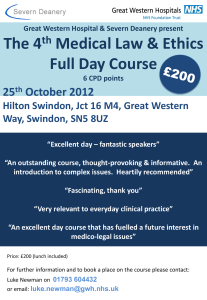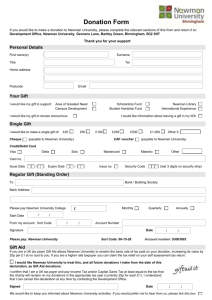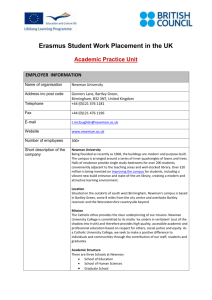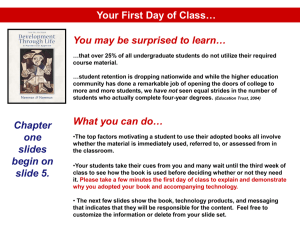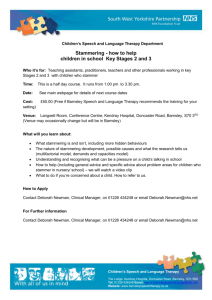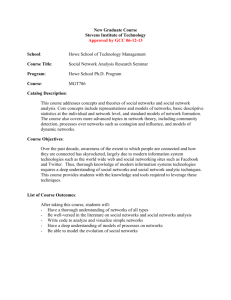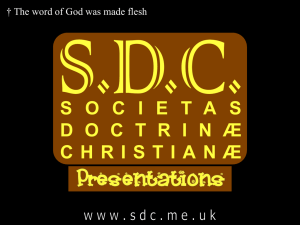KJW_Life_Span_Development_2015
advertisement
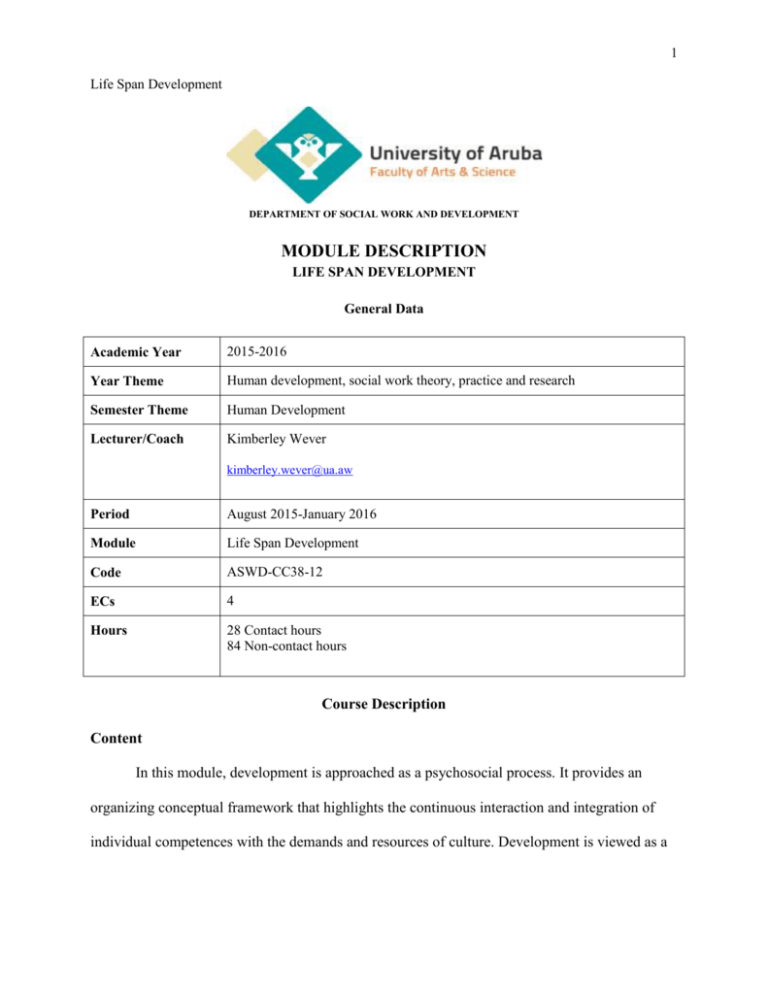
1 Life Span Development DEPARTMENT OF SOCIAL WORK AND DEVELOPMENT MODULE DESCRIPTION LIFE SPAN DEVELOPMENT General Data Academic Year 2015-2016 Year Theme Human development, social work theory, practice and research Semester Theme Human Development Lecturer/Coach Kimberley Wever kimberley.wever@ua.aw Period August 2015-January 2016 Module Life Span Development Code ASWD-CC38-12 ECs 4 Hours 28 Contact hours 84 Non-contact hours Course Description Content In this module, development is approached as a psychosocial process. It provides an organizing conceptual framework that highlights the continuous interaction and integration of individual competences with the demands and resources of culture. Development is viewed as a 2 Life Span Development product of genetic, maturational, societal and self-directed factors. Applying this integrated perspective to an analysis of human development has several advantages: ● It identifies and emphasizes themes and directions of growth across the life span. ● It helps assess the influence of experiences during early life stages on later development ● It clarifies the intergenerational transmission and the reciprocal influences of generation. ● It locates development within a framework of significant relationships. ● It offers a hope full outlook on the total life course. This module will discuss and explore the growth and development of children, adolescents and adulthood from the biological, psychosocial, psychosexual, socio cultural, cognitive, and behavioral and attachment perspectives. The module will focus on both normal and abnormal growth and development and the implications for social work practice. In this way students shall acquire a systemic, holistic and developmental approach to analyzing and assessing social and human problems in a critical and comprehensive manner. The student will develop sensitivity to the ways societies change over time. They become aware that development takes place in a context, which can change people’s life experiences. Some contexts can be natural disasters, financial crisis, epidemic diseases etc. Through the psychosocial framework it highlights the continuous interaction and integration of individual developments with the demands and resources of society. The module will focus on how individuals organize and interpret their experiences, the changes in their behavior, attitudes, worldview and the way they cope with changes in the demands of their environments. The implications for social work practice will be thoroughly discussed and debated. The module will however place emphasis on the psychosocial perspective 3 Life Span Development of human growth and behavior. The module shall also provide insights and understanding on selected aspects common in children, adolescents and adults. This module will explore explicitly the transversal lines of identity and diversity. Objectives 1. To provide a thorough chronological introduction to the study of human development for children, adolescents and adults. 2. To provide insight in the life span of humans from a psychosocial perspective assuming interconnection among people at every period of life. Contents of the module The module will be built around the following units: Unit 1: The Development Through Life Perspective Unit 2: Major Theories for Understanding Human Development Unit 3: Psychosocial Theory Unit 4: The Period of Pregnancy and Prenatal Development Unit 5: Infancy (First 24 Months) Unit 6: Toddlerhood (Ages 2 and 3) Unit 7: Early School Age (4 to 6 Years) DATE & UNIT 25-08 Unit 1 & 2 Unit 8: Middle Childhood (6 to 11 Years) Unit 9: Early Adolescence (12 to 18 Years) Unit 10: Later Adolescence (18 to 24 Years) Unit 11: Early Adulthood (24 to 34 Years) Unit 12: Middle Adulthood (34 to 60 Years) Unit 13: Later Adulthood (60 to 75 Years) Unit 14: Elderhood (75 until death) Unit 15: Understanding Death, Dying, and Bereavement CONTENTS Purpose: The first unit will be twofold. In the first part the basic assumptions of development will be introduced. It will focus on the psychosocial approach to the study of development, including the interrelationship among the biological, psychological, and societal systems, as well as LITERATURE & ASSIGNMENTS Read chapter 1 and 2 of Newman and Newman. 4 Life Span Development the historical changes in life expectancy and the implications of these changes. In the second part of this unit the focus will be the understanding of major theories for Human Development. Core concepts: biological system; culture; developmental change; identity; psychological system; psychological approach; societal system; longevity; theory; evolution; ethology; psychosexual theory; personality; development; cognitive developmental theories; theories of learning. 01-09-2015 Unit 3 Purpose: In the second unit the remaining major theories for Understanding Human Development will be discussed. In addition the psychosocial theory will be discussed, where the focus is on the ongoing interaction of the person and the social environment. Read chapter 3 of Newman and Newman. Assignment: multiple choice exam Core Concepts: Cultural Theory; (dis)continuity; individualism, collectivism; social role theory; systems theory; psychosocial theory; developmental tasks; psychosocial crisis 08-09-2015 Unit 4 Purpose: The fourth unit will focus on the period of pregnancy, which involves intricate interactions between the developing fetus and the pregnant woman. The pattern of fetal development is guided by genetic factors, but the pregnant woman’s health, social support, and emotional well-being can have substantial impact on fetal growth Read chapter 4 of Newman and Newman. Core concepts: Fertilization; development in different trimester; birth process; impact of the fetus on the pregnant woman and vice versa; cultural context of pregnancy and childbirth. 15-09-2015 Unit 5 Purpose: This unit will describe characteristics of newborns and children till the age of 2. This unit will also identify important milestones in the maturation of the sensory and motor systems during this life stage, as well as communication and attachment. Core Concepts: Newborns; sensorimotor intelligence; Read chapter 5 of Newman and Newman. Assignment: Open questions (hand in 14-09-2015) 5 Life Span Development communication; attachment; emotional development; trust; mistrust; hope, withdrawal. 22-09-2015 Unit 6 Read chapter 6 of Newman Purpose: The sixth unit will focus on the toddler. In this life stage and Newman. the toddler is expanding its motor skills in order to explore the environment. Also discussed are the language development and the role of fantasy play, as well as the cognitive and social development. Core concepts: Locomotion; semiotic thinking; communicative competence; fantasy play; play companions; self-control; shame; doubt; imitation; will; compulsion. 29-09-2015 Unit 7 Purpose: In this unit the focus will be children between the ages of 4 to 6 years. An important event is the start of school. Starting school brings an expansion of the child’s social world: encounters with new adults and peers, new social norms, higher expectations, and new information. Each of these changes has an effect on the child’s self-concept. Read chapter 7 of Newman and Newman. Assignment: Group presentation Beonnie and Sharianne Core concepts: Gender identification; early moral development; empathy; caring; perspective taking; 06-10-2015 Unit 8 Purpose: The focus of this unit will be children between the ages of 6 and 11. Also discussed will be the role of friendship and the development of concrete operational thought. This unit will also introduce students to the development of selfevaluation skills. Read chapter 8 of Newman and Newman. Core concepts: Friendship; loneliness; conservation; classification skills; mathematical reasoning; skill learning; self-evaluation; team play; industry; inferiority; education; competence; inertia. 27-10-2015 Unit 9 Purpose: This unit will discuss the physical changes of puberty that are accompanied by alterations in the self-concept. These alterations are prompted, in part, by the realization that one is making a transition from childhood toward adulthood, and, in part, by changes in the way one is Read chapter 9 of Newman and Newman. Assignment: paragraph 6 Life Span Development perceived and treated by others. presentation all students Core concepts: Physical maturation; romantic and sexual relationships; conceptual skills; emotional development; peer group; group identity; alienation; peer pressure; fidelity, dissociation. 03-11-2015 Unit 10 Purpose: This unit will focus on the later adolescent and the search for autonomy from its parents, the development of gender identity, and the maturation of morality. Read chapter 10 of Newman and Newman. Core Concepts: Autonomy; attachment; self-sufficiency; gender identity; culture; sexual orientation; internalized morality; career choice; individual identity; identity confusion; role experimentation 10-11-2015 Unit 11 Purpose: Unit 11 will focus on concepts relevant for understanding development during adulthood, including social roles, intimate relationships, and the decision to have children. Core concepts: Social roles; life course; fulfillment theories; competence; intimate relationships; readiness to marry; childbearing; work; intimacy; isolation; mutuality among peers; love; exclusivity. 17-11-2015 Unit 12 Purpose: This unit will focus on the world of work as a context for development, interaction of work and family life, and the impact of joblessness in the middle of adulthood. This unit also discusses the expansion of caring, as it applies to two roles (a parent and an adult child taking care for an aging parent). Read chapter 11 of Newman and Newman. Assignment: Chapter presentation Shealah and Arlette Read chapter 12 of Newman and Newman. Assignment: Chapter presentation Milvienne Core Concepts: Managing a career; competence in work; midlife career changes; balancing work and family life; partnership; caring relationships; household; generativity; stagnation; interaction; creativity; care; rejectivity; , 01-12-2015 Unit 13 Purpose: This unit will explore the construct of life satisfaction in later adulthood. It will describe different factors that promote intellectual vigor, as well as the process of redirecting energy to new roles and activities. Read chapter 13 of Newman and Newman. 7 Life Span Development Core Concepts: Life acceptance; the SOC model; life goals and satisfaction; personality and well-being; intellectual vigor; new roles and activities; point of view about death; integrity; despair; introspection; wisdom; disdain. 08-12-2015 Unit 14 Purpose: This unit will describe some of the physical changes associated with aging, living arrangements, and gender roles Core Concepts: Longevity; physical changes; fitness; sleep and rest; sensory changes; psychohistorical perspective; life structures; gender role definitions; immortality; extinction; social support; confidence; diffidence. Unit 15 Purpose: This unit will explain the role of mortality in shaping psychosocial development and define the biological stage of death. It will also describe factors associated with the process of dying and the modern ideal of a good death. Lastly it will describe death-related rituals and their functions. Assignment: Open questions (to be handed in on 30-112015) Read chapter 14 of Newman and Newman Assignment: Chapter presentation Rahaida and Adrienne Read chapter 15 of Newman and Newman. Core Concepts: Mortality; process of dying; care of the body, spirit, surviving family, friends, and community; bereavement; grief ; death-related rituals; Entry Requirements None General Students develop and appreciate theories of development. They understand the deeper meaning of development starting from conception and continue through the different stages of life. Students of SW&D become aware of the effects of cultural and historical contexts on human 8 Life Span Development development. They develop sensitivity to the ways societies change over time. They become aware that development takes place in a context, which can change people’s life experiences. Some contexts can be natural disasters, financial crisis, epidemic diseases etc. Through the psychosocial framework it highlights the continuous interaction and integration of individual developments with the demands and resources of society. Students develop a systemic, holistic and developmental approach to all professional tasks and they learn how to analyze and assess social and human problems in a critical, systemic and comprehensive manner. Learning outcomes 1. Has knowledge and understanding of human development and factors that affect human development. 2. Is able to apply rights based driven approaches, critical social work theories and other development based theories and methods of social work 3. Is able to critique and apply knowledge to understand social problems and the person-in-the-environment. Attention for Transversal Lines The following transversal lines are being dealt with in this module in their own distinctive ways. Sustainability: the psychosocial framework and the life-span perspective are the right platform where students will use their knowledge and insight in the different theories on human development in a sustainable way. Through an interconnection between early and later developments the cycle of development within the human being does not stop. Taking into account the influences of history, culture and the changing environment illustrates the sustainability in this module. 9 Life Span Development Diversity: This module deals with a great diversity of ethnicity, cultures and environmental influences on the human development. Civic participation: This module stimulates optimal civic participation through the different societal themes that have influence on the human development as a whole. Identity: This module is exactly build for this kind of transversal line. Identity as a state of being, in this module students will examine their own belief system, and its influence on the individual or on the group as a whole! It takes a prominent form in this module. Learning Methods General The module will be presented in 13 classes of two-and-a-half hours. The teaching approach is dynamic and interactive. Students shall take notes of relevant issues, especially those not in the handouts. Work forms ● Small group presentations ● Participation in class discussions ● In class-exams ● Individual presentations Assessments 1. Mid Semester Assessment: Students will have a mid-semester exam consisting of multiple-choice questions. The chapters to study for the examination are chapter 4 through 8. 10 Life Span Development 2. Final Semester Assessment: Students will have a mid-semester exam consisting of multiple-choice questions. The chapters to study for the examination are chapter 9 through 15. 3. Group chapter presentation: Students will present one chapter. The presented chapter will not be mandatory on their exam. Chapter Date Student(s) Early school age (4 to 6) 29-09-2015 Beonnie Brete Chapter 7 Early adulthood (24 to 34) Sharianne Kelly 10-11-2015 Chapter 11 Middle adulthood (34 to 60) Shealah Maduro Arlette Franken 17-11-2015 Milvienne Dijkhof 08-12-2015 Adrienne Martis Chapter 12 Elderhood (75 until death) Chapter 14 Rahaida Wever 4. In class assignments: Assignment Due date Percentage 15% Multiple choice exam chapter 3 01-09-2015 30% Open questions chapter 5 14-09-2015 (one day 30% before class) Open questions chapter 13 30-11-2015 (one day before class) 30% 11 Life Span Development Paragraph presentation chapter 9 27-10-2015 10% 5. Interview: Students will interview one person in the following age group: Target group Student(s) Middle childhood Rahaida Sharianne Early adolescence Arlette Beonnie Early adulthood Shealah Later adulthood Milvienne Adrienne This assignment is an individual assignment. The assignment has to be video recorded. The aspects to be interviewed are: developmental tasks, psychosocial crisis, central process, prime adaptive ego quality, and core pathology. EVALUATION DEVICES Assignments Due date Grade 100% Mid Semester Assessment: Exam October 2015 30% Final Semester Assessment: Exam January 2016 30% Group Chapter Presentation TBD 10% 12 Life Span Development In class assignments Interview 15% December 2015 Total 15% 100% ATTENDANCE POLICY Attendance and participation are vital elements of active student learning and significantly enhance your chances of successfully completing the module and the program. Students shall attend 80% or more of the 14 classes. The student is registered as absent if he/she misses more than 15 minutes of the class. Repair assignments will be given if the 80% is not met. CLASSROOM ETIQUETTE Remember that, just as presence in the work place is a requirement for compensation, the attentive presence of the student for the entire session is a determining factor in assigning a grade. It is not enough to “come to class”- be involved and help yourself and others to learn. ALL MACHINES (e.g., Laptop, Blackberry, etc.)MUST BE OFF WHEN LECTURING EXCEPT TO TAKE NOTES AND TO DO RESEARCH UPON THE REQUEST OF THE LECTURER. DISABILITY ACCOMODATION Reasonable accommodations are available for students who have a documented disability. Please notify the Lecturer during the first day of class of any accommodations needed for the course. Late notification may cause the requested accommodations to be unavailable. Any 13 Life Span Development student who has a need for accommodation based on the impact of a disability should contact the Lecturer to discuss the specific situation as soon as possible. DELIVERY OF ACADEMIC PAPERS AND ASSIGNMENTS All assignments should be delivered in the following manner: 1. Electronic copy to the lecturer on EDU2.0, before the deadline. 2. Hard copies of assignments must be submitted and signed for. FRAUD/PLAGIARISM 1. Indicate clearly all sources that have been used with the complete reference of literature as per the APA Style. 2. In case of material from Internet, the exact site should be given and the institution, author and date as per the APA Style. 3. All forms of plagiarism will directly affect the evaluation and be given the grade “F”. Any text that is not placed in quotation marks of which lacks an explicit reference to a source is considered own work. Make sure that at no point writings or contributions of others are presented as your own. Therefore, all literary quotes should be placed in quotation marks and sources should be explicitly mentioned, even when paraphrasing. Plagiarism also includes copied texts from the internet incorporated without mention, particularly from other papers, which can be detected easily with modern search technology. 14 Life Span Development LITERATURE Mandatory Newman M. Barbara & Newman R. Philip (2015). Development through life: A psychosocial approach. (12th ed.). Wadsworth: Cengage Learning. Recommended Readings At the end of every chapter a Casebook with recommended readings with additional material related to the chapter. Visit the website www.academic.cengage.com/psychology/newman for online readings.
